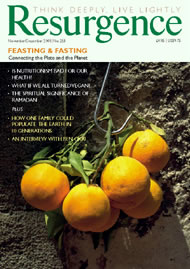EARLIER THIS SUMMER, I spent a month or so writing in a creekside hut in the tidal reaches of a Cornish river. One morning, amidst the water-sparkle of early sunlight, I spotted the fins of some two dozen dolphins. For several hours, I watched them diving and leaping, marvelling at their proximity, before the tide turned and they began to slip away down-river. As the ebb continued, it became clear that others had become trapped in the creek opposite. Soon twenty-six dolphin carcasses had been discovered in the mud.
Rarely do issues of marine conservation make the front page of The Sun, but the next day its readers were treated to the story of ‘Dolphingate’. Whether the deaths can, as was suggested, be blamed on human activities (specifically on Royal Navy sonar) is unproven. What can be said is that a form of fishing called pair-trawling accounts for many more deaths, but because they are not seen, it does not generate the same public response.
The sea’s fragile ecology as a whole suffers from the same ‘out of sight, out of mind’ attitude. Love of the sea is deep-seated in us all. We relish its beauty, stand in awe before its scale and mystery, wait for hours for the nibble-and-tug on a fishing line, or for the sight of its bird-life – or the sudden thrill of glimpsing the breaching of a dolphin. But beneath the surface is another world. What is popularly understood of the natural processes down there, of the life cycles of its species – and the threats to them – is only a fraction of the equivalent on land. Such ignorance has allowed a great deal of damage to be done without anyone noticing – and makes it all the more shocking when it is revealed.
Richard Girling’s Sea Change is a deeply alarming book. We are used to a drip-feed of news stories about coastal erosion, the fishing industry or oil spills, but 1,000 words of journalism or a few minutes of air-time is not enough to explain their vast complexities. In book form, though, presented by a skilled journalist who has spent years with the subject, a picture of the true state of our seas begins to emerge.
Anyone who has read Charles Clover’s devastating book on the world’s fishing industry, The End of the Line, will be familiar with much of what Girling says about the subject. 75% of global fish stocks are now “fully exploited or depleted”. In Europe, larger and larger boats are built to chase fewer and fewer fish. Once a species has been out-fished or an area of ocean stripped, the boats just carry on, pushing on to the shores of West Africa, where stocks are ‘robbed’ from impoverished local populations; or they go deeper, landing previously unseen creatures for which a market soon appears.
But Girling’s main target in his fish section is salmon farming. He has written extensively on the subject in The Sunday Times and reveals the true horror of what goes on in those benign-looking cages in Scottish lochs. Each 75cm fish is given the equivalent space of a bathful of water. Used to swimming the ocean and leaping waterfalls, these extraordinary creatures, when confined, grow flabby and inert, their flesh chewed into by lice. Without exercise, their meat is grey, so dye is fed to them to make it look palatable. Millions die every year; millions more escape to infect and breed with the wild population. In order to feed farmed salmon and trout, some 30 million tonnes of wild fish have to be caught – thus negating any sense of them being a ‘sustainable’ food.
In its most progressive and outward-looking periods – the Elizabethan age, for instance – Britain has made full use of its 5,000 miles of coast and its sea skills. Innovation and enterprise have been promoted by the challenges of crossing great expanses of water. But the sea has now become a playground to us; the great ports are either redundant or forced to reinvent themselves as resorts. While the roads choke with traffic, the possibilities of using sea-ways and coasters to ferry goods are ignored, or stifled by the haulage lobby.
The waters around the UK have a greater range of species than any other marine area in Europe. Some token recognition is made of their value. Under the Habitats Directive, sixty-three marine Special Areas of Conservation (SACs) have been designated, most of them in Scotland, but no funding for monitoring or management goes with the designation. Apart from celebrity species like dolphins, there is little public support for marine conservation. Hard-hitting books like Sea Change could help alter this; help us to use the sea properly, to understand it. After all, it is through the sea that many of our past failings are now coming back to threaten our lives – in its slow rise, its flooding of homes and farmland, in the litter-slicks that revolve around the Pacific, and in the great mysterious shifting of oceanic currents that day by day are changing the planet’s climate.







